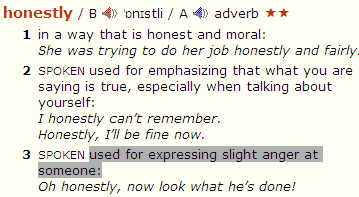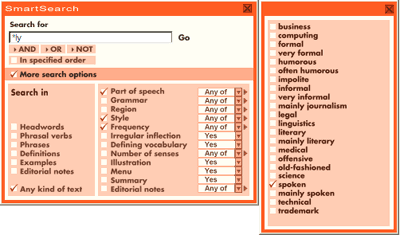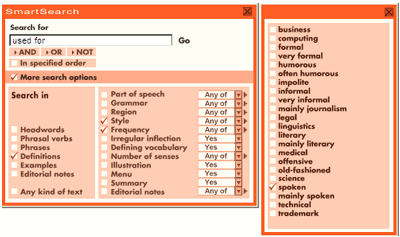|

FROM THE EDITOR
 In
this Issue In
this Issue
 Contributors Contributors
 Letters
to the Editor Letters
to the Editor
 Write
to Us Write
to Us
 Spread
the Word Spread
the Word
 Back
Issues Back
Issues
 Index Index
FEATURE
 Food
and Cooking in Food
and Cooking in
American and British
English
COLUMNS
 Metaphor Metaphor
What we talk about
when we talk about
success and failure
 Focus
on Language Focus
on Language
Awareness:
Introduction
Spoken discourse
Discourse markers
oh, well and like
UK version ¦
US version
 New
word of the month New
word of the month
Are you still looking
for your Valentine?
 Top
Tips for the CD-ROMs Top
Tips for the CD-ROMs
Making sense of
spoken language
 onestopenglish.com onestopenglish.com
|
 |
Top
Tips for the CD-ROMs
by Mairi
MacDonald
Spoken English is not a topic you would expect to be able
to tackle using a learners' dictionary. However SmartSearch on
the CD-ROMs lets you pull out lots of examples of language that is mainly
used in spoken English. By restricting your search according to part of
speech or frequency it is possible to retrieve a manageable list of words
— perfect for creating simple activities on spoken discourse.
The following activities aim to familiarize students with
the function of adverbs such as actually and basically in
spoken English as well as exploring the meaning of fixed expressions like
to put it mildly and don't hold your breath.
The examples and definitions in the activities are taken
from MED CD-ROM. If you are using the Essential CD-ROM, the searches
described below will return similar results.
1 Adverbs in spoken English
Adverbs ending in -ly can contain completely different
meanings when used in speech. For example the meaning of honestly
in spoken language is completely different to the meaning that your students
will be most familiar with:

Using MED CD-ROM to provide example sentences, the following
activity explores the function of these words in context. To find adverbs
used in spoken English, try the following search:
Click on SmartSearch, type *ly into the
search box and tick the following options:
- Any kind of text
- Part of speech: adverb
- Style: spoken
- Frequency: very high frequency/high frequency/quite
high frequency

Create a new document in your word processing program.
Make a table with two columns, one for the example sentences and the other
for the definitions. Copy and paste the relevant definitions and example
sentences from MED CD-ROM and underline the keywords. Students should
match the example sentences to the definitions, e.g.:
Oh honestly, now look what he's done!
used for expressing slight anger at someone
|
Read through the example sentences on the left and
try to match them with the correct definition on the right.
|
'She really is a beautiful
woman.'
'Oh, absolutely.' |
|
|
used as a reply for saying that you
completely agree with someone |
|
|
It was yesterday, no actually
it was Monday morning. |
|
|
used for admitting something |
|
|
'Did you spend much money?'
'Well, yes. Quite a lot, actually.' |
|
|
used for answering 'no', when you think
someone has suggested something that is impossible |
|
|
Basically, you should
have asked me. |
|
|
used for emphasizing that what you are
saying is true, especially when talking about yourself |
|
|
'If he'd gone to bed early, he wouldn't
be so tired.'
'Exactly!' |
|
|
used for emphasizing that you are giving
your own opinion |
|
|
Funnily enough, I heard someone
say exactly the same thing this morning. |
|
|
used for emphasizing the most important
point or idea in what you are saying |
|
|
'Are you hung over?'
'Hardly! I don't even drink!' |
|
|
used for expressing slight anger at someone |
|
|
I honestly can't remember. |
|
|
used for expressing
surprise |
|
|
Oh honestly, now look what he's
done! |
|
|
used for saying that you think something
is surprising or unusual |
|
|
Personally, I think we should
stick with our original plan. |
|
|
used for showing surprise or doubt about
something |
|
|
'You mean he took the money for himself?'
'Precisely.' |
|
|
used for showing that you agree with
what someone has just said |
|
|
'I'm thinking of leaving my wife.'
'Seriously?' |
|
|
used for showing that you completely
agree with what someone says or that you think they are
exactly right |
|
|
He's getting married? Surely you
can't be serious! |
|
|
used when correcting what someone has
said or thinks, or what you yourself have said |
|
|
'Mark is such an idiot!' 'Totally.'
|
|
|
used for saying you really agree with
something someone said |
|
Answers
|
2 Expressions
If you are focusing on the function of fixed expressions
in spoken language, one idea is to search for entries containing the phrase
used for in the definition text. Once you have run your search,
choose phrases and expressions from the search results panel appropriate
to the level of your students. Copy and paste the definitions and example
sentences and use these to create an activity. The following activity
is just one way in which you can exploit this material in your lessons.
Click on SmartSearch, type used for into
the search box and tick the following options:
- Definitions
- Style: spoken
- Frequency: very high frequency/high frequency/quite
high frequency

| 1 |
Give students the list of sentences
in Worksheet A. In pairs get them to discuss the phrases in
bold. |
| 2 |
Hand out Worksheet B (definitions).
Explain that these words are fixed expressions and that it is
often impossible to guess their meaning. Ask students to match
the definitions in the second sheet with the sentences in the
first. If they get stuck, they can look up the underlined word
in each sentence in the dictionary. |
| Let them cancel the whole project. It's
no skin off my nose. |
| Wait a minute, that's not
what I said! |
| Things haven't been going very well here,
I'm afraid. |
| Be that as it may, I still
think Mr Livingstone is the best man for the job. |
'Jenny doesn't concentrate when she's driving.'
'I beg your pardon! She's a very good driver!'
|
| You'd think he'd just give up, but not
a bit of it. |
'He said he'd come.'
'Don't bank on it — he's still in bed.' |
| He arrived over an hour late for the meeting
- I ask you! |
| What's the big idea, telling
her about the accident? |
| There's no call for regret. |
Definitions
| used for emphasizing that you think something
is silly or shocking |
| used for saying that even if something is true,
it does not affect your opinion |
| used for saying that something you would expect
to happen has not happened |
| used for saying you disagree with what someone
is saying or doing, or you want them to listen to you |
| used for asking someone why they have done
something that you think is wrong or annoying |
| used for politely telling someone something
that might make them sad, disappointed, or angry, for example
when you cannot do what they want or do not agree with them |
| used for saying that you think something is
not necessary or suitable |
| used for telling someone that something will
probably not happen |
| used for saying that you do not care if someone
does a particular thing because it will not affect you |
| used for showing that you disagree very strongly
with what someone has just said |
Answers
|
|





